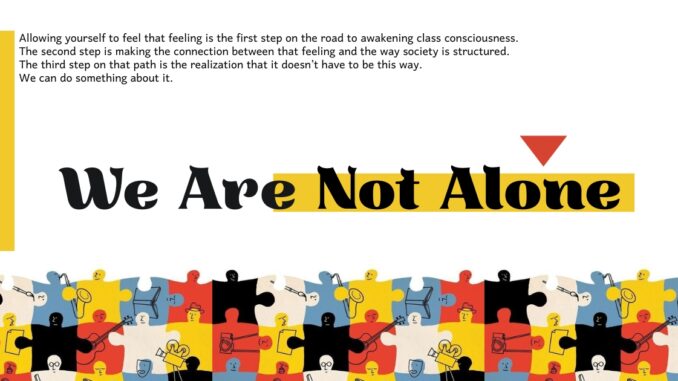
Estimated reading time: 6 minutes
Even though the disciplinary weakness of the U.S.-Canadian “left” — including our so-called Communists — is one of our favorite topics at The Clarion, we have to speak right now about the strengths of the situation here. It’s not helpful to point out mistakes unless you’re also willing to suggest solutions.
We’ve written a lot about the masses; we’ve written a lot about the advanced, the middling, the tailing — that is, what portions of the great mass of U.S. workers and small professionals are discovering their existence as a collective group with shared interests and goals. What we haven’t written about is the way in which people who are becoming disillusioned with capitalism, people who can see and feel that the social system and the way we live is wrong, brutal, inhuman, can be brought together. That task, the awakening of the discontented to the possibility of another world, another way of living, a real existence where people no longer exploit each other for economic gain, is fundamental to our mission of bringing about the advent of such a society.
Before learning theory, before studying Marx, Engels, Lenin, Stalin, Mao, Gramsci, Rodney, Cabral, people must want to learn. They must feel deeply that society as it exists is unjust.
The society we live in has worked out a kind of self-defense mechanism to deal with people who realize this. They get called burn-outs, idealists, unrealistic. The child of a professional family who doesn’t want to go into business as a CPA or a doctor or a lawyer is “troubled.” Because they’re told by everyone they know that what they feel is abnormal, that most people know the world is an unjust meat grinder, that they know the lifestyle the great majority of the people in the U.S. is based on the misery of others and they just choose not to think about it — this causes a kind of socially-induced sickness. The people who feel the most deeply and most humanly are constantly told that, far from being the most ordinary, they are defective.
In a sense, this is true. They are defective from the point of view of the architects and engineers of society. They are gears with broken teeth in the eyes of the ruling class, the capitalist class, that group of bankers and industrialists who own everything yet do nothing. In ever-greater numbers, people are beginning to realize that their feelings of discomfort are valid — that they should feel moral outrage at the existence of sweatshops making fast fashion and child-slaves in the Congo mining minerals for their iPhones. Allowing yourself to feel that feeling is the first step on the road to awakening class consciousness. The second step is making the connection between that feeling and the way society is structured. The third step on that path is the realization that it doesn’t have to be this way.
We can do something about it.
In an ideal world, one where we’d already built a powerful working-class party that had gathered up all the theoretically advanced Communists together, we would have not one but many newspapers. There would be a mass paper solely to address those people that are still waking or who are awake but not yet willing (or able) to take the last steps to being militant Communists and then a theory journal for those militant Communists to debate the truth, the best way to overthrow capitalism, etc. Because our movement isn’t unified behind that kind of party (despite what the poseurs at CPUSA say), we have been mixing those types of articles here at the Clarion. Our core readership is mostly already-committed Communists.
But we can’t rely on people coming to Communism spontaneously. We have to reach the group of people who are being torn out of their social positions — people being sidelined. Revolutionaries going back to Lenin have been warning about the pitfalls of relying on spontaneous action; it was only through conscious development that the revolution of October was possible. Without intervention, lots of those children of professionals or the relatively well-to-do will do what comes naturally as the inevitable result of spontaneity: burn out, become despondent and chronically depressed, or turn into anarchists.
In all likelihood, that means you, the reader, are either the Communist militant who has the task of helping people you know move from realizing that capitalism is a theater of horrors to real class conscious Communism or you are someone who has seen that things are bad and getting worse. Maybe someone sent you this article so you could know that you are not alone.
The next steps won’t feel like doing much at all because the truth is that this realization alone is not enough. You have to study. You’ve got to develop your understanding of how the capitalist machine works so you can help us all build weapons to take it down. Studying isn’t fun and it isn’t glamorous. It doesn’t feel like accomplishing anything, much less setting out to make a revolution, but it is necessary. We can’t avoid our mistakes without reviewing them and we can’t bring down an enemy that we don’t understand.
We’ve got to get together, not just on our own, but in groups, and start to put together an organization that spans the entire U.S.-canadian empire, examine and report on its local conditions in each region, and create a plan to annihilate it root and branch. We have to plan to unite with all the oppressed peoples — each of the Indigenous nations, the Black nation — and get ready to strike.
The work has already begun: the All-Empire Workers’ League and other similar groups are preparing to create a Decolonial Communist Party.
You should join us.
You are not alone.


Leave a Reply